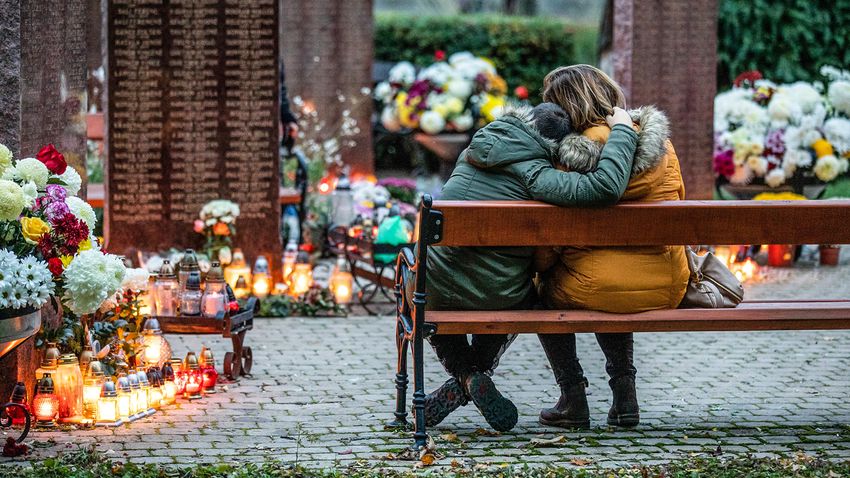It is typical of our society to avoid the subject of death, and it is considered taboo to talk about any kind of loss. There are two main reasons for this: on the one hand, the environment usually reacts badly when someone talks about their grief-related experiences, and on the other hand, we learn from a young age that it is not appropriate to burden others with our difficult feelings.
Most of us don't have models of what to do with grief and how to help each other on the road to healing. It is a vicious circle from which it is difficult, but not impossible, to get out of - we also talked about how to do this with mental health specialist Demeter Tünde, Grief Processing Method® specialist.
One of the hardest weeks of the year has arrived. Cemetery candlesticks are lit everywhere in the country, whether in the grave yard or at home, but we face our difficult feelings. The awareness of the finitude of life, the pains and anxieties connected to the death of our loved ones and ultimately to our own impermanence are approaching. In this unstable situation, other losses in our lives also become alarming, and it is also possible that we plunge into emotional depths that we do not dare to reach during other times of the year. We relive, we experience grief - which can be much more multifaceted and diverse than most people think.
Deaths and the loss of loved ones come to mind when we think of grief, but in fact any kind of loss can be associated with it. All letting go is also a grieving process, that is, we go through similar processes when a marriage breaks up or when we lose a job. "According to the Grief Processing Method®, more than forty types of loss can befall us during our lifetime. This can be a move, a break-up, a change of job, or a change in life phase, for example when children are born or leave, as well as a dream, a hope or the loss of trust.
It is important to see that we experience loss even when we find ourselves in a more positive life situation, for example, we get a better job or get married, since the daily life we were accustomed to before changes. Grief itself is actually the natural and normal human reaction to loss, the sum of all those often diametrically opposed emotions that are caused by a big change or the upheaval of the usual order of our lives," explained Demeter Tünde.
Good grief, bad grief
Grief is unpredictable. Unfortunately, we never know how long the process will take or what will be required of us next, and we cannot hope that the road will be easier after a certain predetermined point. While grieving, we bounce back and forth between emotions, it's like riding an emotional roller coaster. "Whatever loss we are grieving, it is very important to accept what we are feeling at the moment. Let's try to be permissive with ourselves, take into account that we are unique, our grief is unique. "We should not compare ourselves and our grief due to our loss to that of others, and we should not compare our emotions experienced during the process to our own previous losses," Tünde advises in the first round.
In reality, however, we see that many misunderstandings surround the topic, which is why we set unrealistic expectations for ourselves and our environment. For example, we learned from the grief and loss processing specialist that the five stages of grief are typically referred to incorrectly. The Swiss psychiatrist Elisabeth Kübler-Ross formulated these stages (rejection, anger, bargaining, depression, acceptance) in relation to the terminally ill people she accompanied in their last months. If we are healthy, but for whatever reason we are forced to mourn, let's forget these steps, don't force ourselves to live through the stages!
There is no recipe for processing losses
Living through a grieving process, we may have concentration problems, sleep problems, or even eating and memory problems, these are all natural - just as so many other symptoms can occur! Because grief can take many forms, we should never judge ourselves or despair if we feel that we are not behaving "as we should." We help ourselves the most by giving ourselves time and creating an opportunity to experience our emotions, and to communicate honestly about what is going on inside us. However, it is more typical that we smile, pretend to be cheerful, hide our sadness because of other people's expectations - and if we do this, it is important to know: it is not our fault, unfortunately this is what society really expects of us.
"In the old world, when someone lost a loved one, they went through a year of mourning. In such cases, it was appropriate for him to wear black, to show and experience his grief, and his environment accepted him when he was not well and gave him space to talk about his feelings and pain. So the community had a tool that helped them process the losses. One year may not have been enough to overcome all the difficulties, but there was some kind of system to the grief. On the other hand, now our loved ones mostly die in hospital, so it is harder for us to relate to their loss, and then when grief falls on us, everyone expects us to get over our pain quickly. This is not only the case in connection with a death, we can also end up on the floor following a breakup or job loss, and the sentences addressed to us will be similar. For example, to "stop spinning" on the topic so much or to "move on". When a mourner is told this, it is not because he really needs it, but because
on a social level, we don't have the means or models to endure the pain of others.
We don't know how to help him, so we feel helpless, and actually we want him to move on quickly, to get this over with as soon as possible. Other times we say 'be strong, don't be sad'. But if someone is grieving, why not be sad? Why should it be strong? He's just feeling pretty bad, why are they still expecting something from him that he's incapable of doing at that moment?" - explains Demeter Tünde. In the same way, it can be difficult after a divorce to hear that "he didn't suit you" or that "you're better off without him" - we shouldn't contradict the other person's feelings, especially don't tell them how to feel, and don't put extra expectations or extra weight on them by that we try to help with unsolicited advice and intellectual comments.
You have time
We shouldn't expect ourselves to get over difficult feelings quickly either. The soul does not work according to "necessity", we cannot force the processing, nor do we help ourselves by trying. Unfortunately, society, even our closest loved ones, will tell us to "get over it", but the reality is that experiencing pain cannot be rushed.
We need to give ourselves time, to walk the dark path that we fear the most, because unfortunately it cannot be avoided.
The specialist points out that we are going astray even if we encourage each other that "time will solve everything". This is a big misconception, because time only buries feelings, it does not dissolve them. If we hand over the reins to time and just wait but don't work with our difficulties, they accumulate inside us. After a while, all this leads to the "cooking pot effect", and the tension is expected to "burst out of us", for example in the form of a mental or physical illness. Tünde adds: "when we don't talk about our difficulties, losses and grief, it can also lead to loneliness. Because we try to avoid unsolicited advice or we don't want to burden our environment, so we prefer not to socialize or meet anyone. We physically and emotionally withdraw from others, which can even lead to depression over time. That is why it is very important that if we cannot find a suitable partner in our environment to process the mourning process, we should visit a support group or a specialist."
How to help ourselves and others?
Instead of urging us to process the loss, we must first realize that we have the right to grieve, even if the world does not suggest so. To do this, we must first be honest with ourselves, recognize and label our feelings, and then share them with the right people. It's okay to feel bad, and it's okay to talk about how we're not doing well. We can bring grief into everyday life, because it can have its place - among us, among our loved ones.
"According to the Grief Processing Method®, the most important thing is not to judge us, not to criticize, not to start analyzing, but
simply listen to us with respect and dignity.
If we cannot find a way to do this in our environment, we can choose from other options. We can also take part in individual or group sessions, where we can talk about our problems and sadness without anyone providing us with unsolicited advice or misconceptions, and we can learn an action program that will help us through difficult moments," explains the specialist.
According to him, grief processing also gives us the opportunity to learn to say goodbye to our negative feelings, to be able to forgive ourselves and others, to be able to formulate and express those previously unspoken thoughts and emotions that are connected to a lost person, whatever the reason. either a move away or a death. All of this helps us remember the past, a lost relationship or individual with love. We can improve when processing grief, once we experience that all the pieces of the puzzle have fallen into place, and in the future we will know how to handle our own grief well, as well as that of others.
Egy.hu
Featured image: MTI/Balázs Mohai












